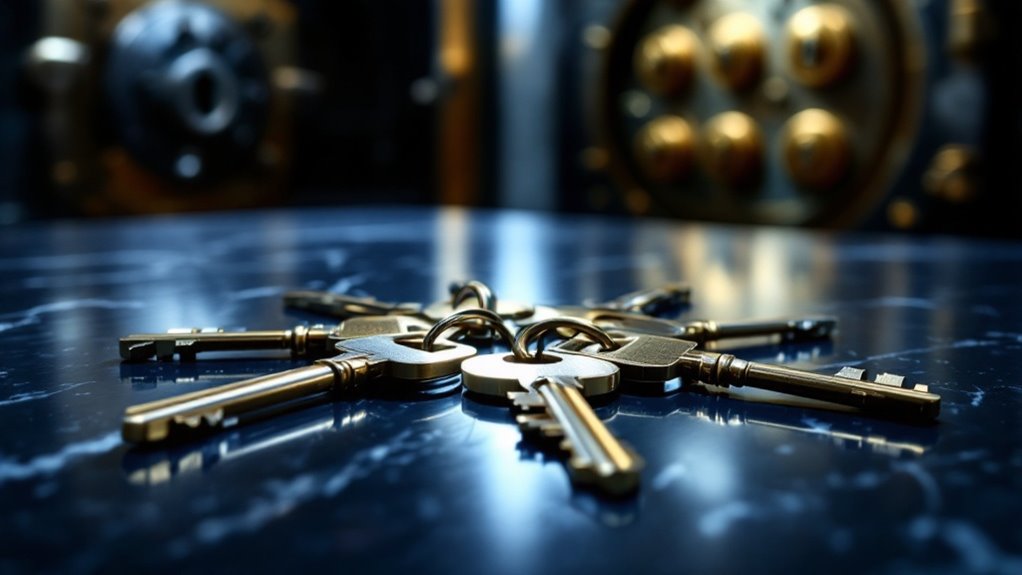Web crypto wallets serve as digital vaults, safeguarding the keys to cryptocurrency kingdoms rather than the coins themselves. These sophisticated tools enable users to manage, trade, and interact with various digital assets across blockchain networks. Like a Swiss Army knife for the crypto world, they combine hot wallets for active trading and cold storage for enhanced security. While some entrust their keys to third parties, others maintain full control through non-custodial options. The journey through this evolving financial landscape requires both vigilance and curiosity.

As the cryptocurrency revolution continues to reshape our financial landscape, web crypto wallets have emerged as digital gateways to the decentralized future. These sophisticated tools serve as virtual vaults, storing not the cryptocurrencies themselves but rather the essential keys that grant access to digital assets across various blockchain networks.
Like a master key to a digital kingdom, these wallets enable users to interact with cryptocurrencies such as Bitcoin and Ethereum while maintaining secure control over their virtual wealth. Since its introduction in 2009, the Bitcoin Core wallet has pioneered the evolution of cryptocurrency storage solutions. Supporting multiple blockchain networks allows users to manage diverse digital assets within a single interface.
The world of web crypto wallets is diverse, offering solutions that cater to different needs and security preferences. Hot wallets maintain constant internet connectivity for frequent traders, while cold wallets stand guard offline like digital fortresses. Popular solutions like Ledger hardware wallets provide enhanced security through offline storage capabilities.
Some users opt for custodial services, entrusting their keys to third-party providers, while others firmly grasp their financial autonomy through non-custodial options. Multi-signature wallets add an extra layer of security, requiring multiple approvals like a high-tech version of the nuclear launch codes.
Modern web wallets come equipped with an impressive arsenal of security features. Two-factor authentication acts as a digital bouncer, while encryption wraps sensitive data in protective layers of mathematical complexity.
Biometric authentication guarantees that only the rightful owner's unique biological signatures can access their digital treasures. Yet, these protections aren't impenetrable – the constant cat-and-mouse game between security experts and cyber criminals continues.
The integration of web wallets with the broader blockchain ecosystem has opened new horizons for users. They serve as portals to decentralized finance, enabling participation in complex financial instruments that would make traditional bankers' heads spin.
From trading NFTs to interacting with smart contracts, these wallets have become Swiss Army knives of the crypto world. However, users must remain vigilant, following security best practices like using strong passwords and enabling two-factor authentication.
In this brave new world of digital finance, web crypto wallets stand as both guardians and gateways, bridging the gap between traditional currency and the decentralized future that beckons.
Frequently Asked Questions
How Do I Recover My Wallet if I Lose My Device?
To recover a lost wallet, one must use their previously stored seed phrase – a sequence of 12-24 words generated during setup. Entering these words in exact order restores access to funds and accounts.
Can I Send Cryptocurrencies Between Different Types of Web Wallets?
Yes, cryptocurrencies can be transferred between different web wallets as long as they support the same blockchain network. Users simply need the recipient's correct wallet address to complete the transaction successfully.
What Happens to My Crypto if the Wallet Provider Goes Bankrupt?
If a wallet provider declares bankruptcy, customer assets may be frozen and treated as unsecured claims. Recovery depends on custody arrangements, with self-custodial wallets offering better protection than custodial services.
Are Web Crypto Wallets Safe From Phishing Attacks?
Web-based wallets remain vulnerable to phishing attacks despite security measures. Users face risks from fake websites, malicious extensions, and social engineering. Regular security practices and hardware wallets provide better protection against these threats.
Can I Connect My Web Wallet to Decentralized Finance Applications?
Users can connect web wallets to DeFi applications through protocols like WalletConnect. Popular platforms such as Uniswap, Aave, and Compound support direct wallet integration for trading, lending, and staking cryptocurrency assets.









